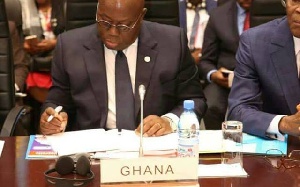The President of the Republic, Nana Addo Dankwa Akufo-Addo, has outlined his programme for the social and economic transformation of the country, and is therefore urging investors and CEOs of the largest African and international companies to invest in Ghana.
This programme of social and economic transformation, according to President Akufo-Addo, is hinged on restructuring the governance institution of the country, modernising agriculture to enhance its productivity, a clear industrial policy, and rationalising the financial sector so that it supports growth in agriculture, and growth in manufacturing and industry.
This, in the view of the President, is the way a resilient Ghanaian economy can be built, “a Ghana beyond aid; a Ghana capable of mobilizing its own material and human resources to build a strong economy capable of generating prosperity for the mass of its people, a Ghana no longer dependent on handouts and charity.”
The President made this known on Tuesday, March 21, 2017, when, together with the President of Senegal, President Macky Sall, addressed a presidential panel at the 5th edition of the Africa CEO Forum, in Geneva, Switzerland.
Despite inheriting “an economy confronted with significant challenges” – challenges which include a 74 per cent debt-to-GDP ratio; a growth rate of 3.6% in 2016, the lowest in the last 23 years; erratic power supply; declining agricultural and industrial growth rates; widespread unemployment – President Akufo-Addo indicated that the people of Ghana voted emphatically for him to change their circumstances and the direction of the country.
To this end, he told the Africa CEO forum that his government has introduced measures to stimulate growth in the private sector, a monetary policy that will stabilise the currency and reduce significantly the cost of borrowing, and a raft of tax cuts to bring relief to businesses.
“These interventions will lower the cost of doing business and shift the focus of our economy from taxation to production.
We are confident that, as businesses recover and expand, corporate taxes will be reduced to promote further re-investment and private sector expansion, all within a framework of a stable macro-economy, as we tackle the 9% deficit.
We have committed ourselves to reducing the deficit to 6.5%, with a further reduction in the next year. We are putting in place strong measures to increase revenue mobilisation, by plugging leaks and reforming the existing tax exemption regime,” he added.
On the delivery of stable, affordable power, “which is critical to the success of our efforts”, President Akufo-Addo stated that by the end of 2018, the current production of crude oil of 150,000 barrels a day will increase to 250,000 a day, and the current output of gas will move from 150 million scfs to 250 million scfs.
This, he indicated, “will enable us to generate from our gas resources 1,000 megawatts of electric power, up from the current figure of 400 megawatts. There are significant opportunities for investing in our oil and gas sector, both in the upstream and downstream markets.
We expect to augment our energy supply by increasing the proportion of renewable energy in the national generation mix.
We will also develop solar and wind mini-grids through public private partnerships… and, thus, pave the way, hopefully, for large investments in our energy sector to support our drive for rapid economic development.” On bridging the infrastructural deficit in the country, President Akufo-Addo revealed that his government intends to embark on an aggressive public private partnership programme to attract investment in the development of Ghana’s road and railway infrastructure.
“We are hopeful that, with solid private sector participation, we can develop a modern railway network with strong production centre linkages and with the potential to connect us to our neighbours to the north, i.e. Burkina Faso, and west, i.e. Cote d’Ivoire,” he explained.
Touching on the transformation of the Ghanaian economy from an exporter of raw materials to a value-added one, he noted that apart from the 1-District-1-Factory, government, in partnership with the private sector, will develop strategic industries out of the country’s abundant natural resources of bauxite and iron ore.
Additionally, he added that his government will establish a Bauxite/Aluminium Development Authority to assemble the relevant financial resources for the systematic exploitation and development of the country’s bauxite resources.
“By the same token, we have decided to exploit our substantial iron ore and manganese deposits, situated in the Western and Northern regions of our country, to build an integrated steel industry to serve the needs of our country and region. An appropriate Development Authority will also be the focus of this project,” he said.
On tackling the issue of widespread corruption, the President indicated that this phenomenon requires a sincere and effective policy of both identifying and punishing acts of corruption, and, more importantly, putting in place mechanisms that discourage public and private actors from engaging in such acts.
“We are in the process of setting up by Act of Parliament an Office of Special Prosecutor, which will be independent of the Executive, to investigate and prosecute offences of corruption of public and private delinquents, past and present,” he said The teachings of the Public Procurement act, he stressed, will be adhered to “so we can depart from the practice of sole sourcing in the award of contracts that has been the bane of our recent history.”
Business News of Saturday, 25 March 2017
Source: rainbowradioonline.com













